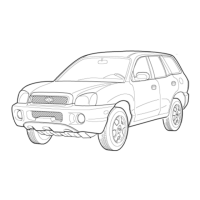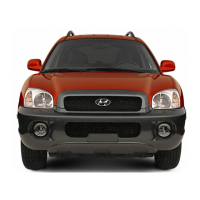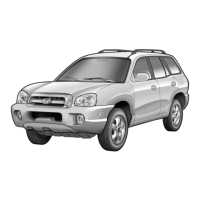Do you have a question about the Hyundai 2005 Santa Fe and is the answer not in the manual?
Information regarding the potential adverse effects of improperly installed two-way radios or cellular telephones on vehicle electronic systems.
List of numbered components and their locations within the vehicle's instrument cluster for identification and reference.
Guidance on recommended fuel types and additives, including precautions for gasohol and MTBE.
Instructions on how to lock and unlock vehicle doors using keys and internal switches, including safety warnings.
Detailed information on seat belt usage, precautions, and adjustments for optimal safety and occupant protection.
Explanation of the SRS system, its components, sensors, and deployment control for enhanced occupant safety.
Information on the SRS indicator light function, normal operation, and when to seek inspection from a dealer.
Explanation of the low oil pressure warning light, its causes, and recommended actions to prevent engine damage.
Explanation of the fuel gauge needle's function and how it indicates the fuel level in the tank.
Description of the engine coolant temperature gauge, normal operating range, and actions for overheating.
Instructions on how to use the windshield washer system, including notes on operation duration and fluid reservoir.
Detailed instructions on how to electrically open, close, and adjust the sunroof, including manual operation.
Information on the integrated HomeLink system for controlling garage doors and other devices via the rearview mirror.
Step-by-step guide on how to set and activate the cruise control system for maintaining a desired speed.
Overview of the heating and ventilation system controls, including air intake, fan speed, and airflow direction.
Instructions on using the climate control system to defrost or defog the windshield and windows effectively.
Explanation of the automatic climate control system's operation, including temperature settings and sensor functions.
Explanation of AM and FM radio signal reception, factors affecting signal quality, and common reception phenomena.
Description of the stereo system's components and controls, including radio operation and CD player functions.
Instructions for using and retracting the manual antenna, including precautions for car washes and garages.
Critical safety information regarding the dangers of engine exhaust fumes and precautions for ventilation.
Detailed instructions on starting the engine, including key positions and safety precautions related to the ignition switch.
Guide to operating the automatic transaxle, including starting procedures, gear positions, and sports mode.
Explanation of the ABS system's function, operation during braking, and normal system feedback.
Information on the benefits and safe operation of full-time 4WD, including driving on various surfaces and tire requirements.
Recommendations for driving in severe winter conditions, including tire preparation and safe practices on snowy or icy roads.
Guidance on selecting and installing proper trailer hitches, emphasizing safety and compatibility with the vehicle.
Method for calculating the vehicle's available cargo and luggage load capacity based on occupant and vehicle weight.
Troubleshooting steps for engine starting issues, including checks for fuel, battery, and ignition components.
Detailed procedure for jump-starting a vehicle safely, including battery precautions and cable connection instructions.
Actions to take if the engine overheats, including safety warnings about the radiator cap and coolant.
Step-by-step instructions for changing a flat tire, including safety procedures and tool usage.
Guidelines for safely towing the vehicle, including proper methods for 2WD and 4WD models and necessary precautions.
Information on obtaining replacement keys and opening doors if keys are locked inside the vehicle.
Information on protecting the Hyundai from corrosion, including common causes and preventative measures.
Guidelines for washing and waxing the vehicle, including tips for cleaning the exterior and underside.
Overview of maintenance requirements, divided into scheduled procedures, general checks, and DIY tasks.
Key requirements for scheduled maintenance, including inspection frequency and retention of service receipts.
Specific maintenance schedules for vehicles operated under severe driving conditions, with recommended intervals.
Detailed explanations of various scheduled maintenance items, including engine oil, filters, fluids, and belts.
Identification and location of key components within the engine compartment for inspection and service.
Instructions on how to check the engine oil level, including recommended oil types and safety precautions.
Step-by-step guide for changing the engine oil and filter, including procedures for adding oil and filter replacement.
Information on spark plugs, including replacement intervals, symptoms of poor performance, and recommended types.
Guidance on checking and replacing fuses and fusible links, including safety precautions and fuse panel identification.
Instructions for checking the battery, including cleaning terminals, handling precautions, and warnings about battery hazards.
Overview of the emission control system, including crankcase, evaporative, and exhaust systems for regulatory compliance.
Information on the catalytic converter, its function, operating temperature, and safety precautions to prevent overheating.
Comprehensive tire information, including size, inflation, sidewall labeling, terminology, and quality grading.
Guidance on recommended tire inflation pressures for optimal ride comfort, tire wear, and stability.
Summary of Hyundai vehicle warranties, including limited, powertrain, anti-perforation, and emission warranties.
Procedure for reporting vehicle safety defects to NHTSA and Hyundai Motor America for potential investigation and recalls.
Key vehicle measurements including overall dimensions, wheelbase, and tire specifications.
Engine specifications, including type, bore x stroke, displacement, firing order, spark plugs, and idle speed.
Chart detailing recommended fluids and lubricants for engine, transaxle, coolant, and other vehicle systems.
| Brand | Hyundai |
|---|---|
| Model | 2005 Santa Fe |
| Category | Automobile |
| Language | English |











